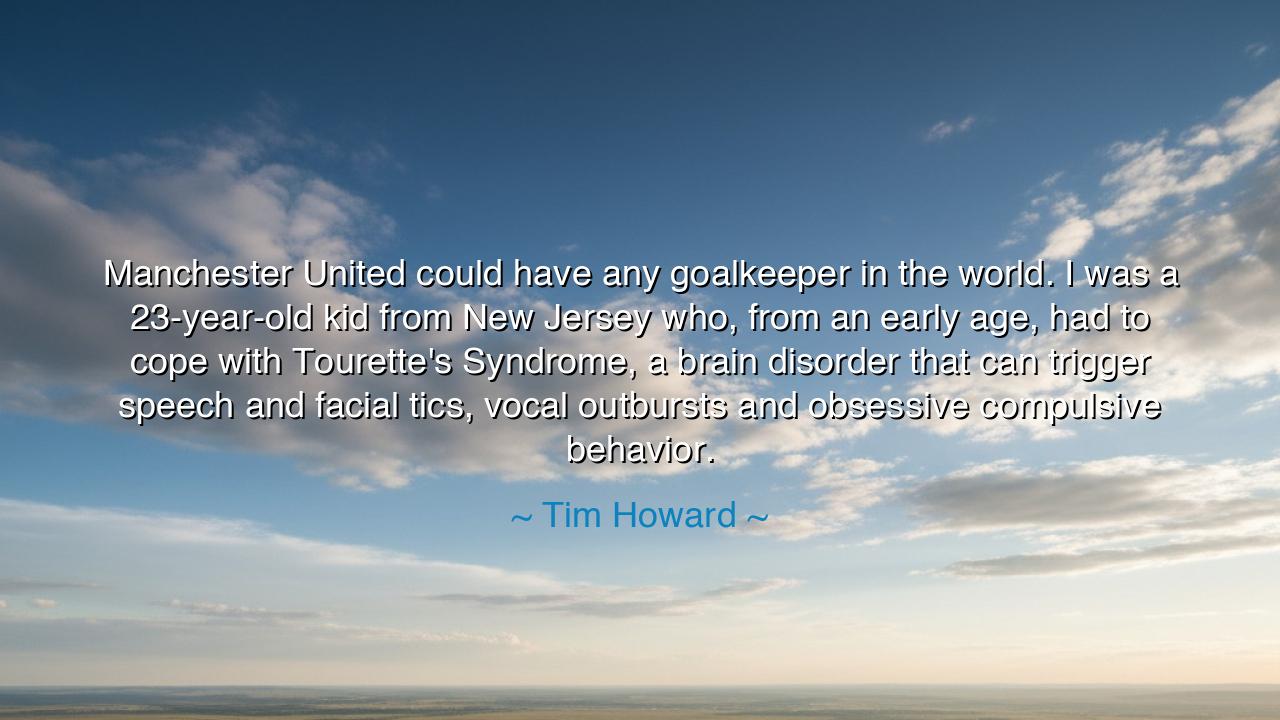
Manchester United could have any goalkeeper in the world. I was a
Manchester United could have any goalkeeper in the world. I was a 23-year-old kid from New Jersey who, from an early age, had to cope with Tourette's Syndrome, a brain disorder that can trigger speech and facial tics, vocal outbursts and obsessive compulsive behavior.






The words of Tim Howard—“Manchester United could have any goalkeeper in the world. I was a 23-year-old kid from New Jersey who, from an early age, had to cope with Tourette’s Syndrome, a brain disorder that can trigger speech and facial tics, vocal outbursts and obsessive compulsive behavior.”—resound like the song of a warrior who has stood before his destiny, trembling not with fear, but with resolve. They tell a story of humility, of triumph against the odds, and of the strange alchemy by which weakness is turned into strength. In his words, there is awe—not only at the greatness of the stage he stood upon, but at the mystery of how someone so unlikely could stand there at all. It is the ancient tale, retold in modern form: that the gods often choose the wounded to do their greatest work.
When Howard speaks, he does not boast; he marvels. For Manchester United, one of the most powerful and storied clubs in the world, could indeed have chosen any goalkeeper—seasoned veterans, global stars, men of perfect pedigree. Yet they chose a young man from New Jersey, a place far from the marble halls of European football, a boy marked not by perfection but by struggle. From the beginning, Howard’s path was shaped by Tourette’s Syndrome, a condition that made his mind and body rebel against him in ways he could not control. Every tic, every involuntary motion, could have been a reason to hide. But he did not hide. He trained, he fought, and he learned to channel what others called his disorder into discipline and focus. What once seemed his burden became his blessing.
This transformation is one the ancients would have understood well. The poet Homer sang of heroes scarred by battle, of Odysseus, who was not the strongest of warriors, but the most enduring. His wounds, his years of wandering, his cunning—these were the very things that made him great. Likewise, Tim Howard’s story is not about the absence of imperfection but the mastery of it. His Tourette’s did not vanish—it became his forge. It taught him control, patience, and resilience. Where others sought calm in stillness, he found it in motion; where others broke under scrutiny, he learned to find stillness amid chaos. And when the roar of Old Trafford—the great stadium of Manchester—rose around him, he stood unmoved, as though the years of inner battle had prepared him for this very noise.
Howard’s quote is a reminder that adversity is the first teacher of greatness. The world often looks for heroes who are unbroken, flawless, unscarred—but true strength is born from the opposite. It comes from those who have wrestled with their limits and learned to rise beyond them. A man who has never struggled cannot know his depth. A man who has fought against himself and prevailed can face any foe. Howard’s journey tells us that the victory worth having is not over others, but over the chains that seek to bind one’s own spirit.
There is also humility in his words. “They could have had any goalkeeper in the world,” he says, as if to acknowledge the miracle of grace that lifted him from the ordinary to the extraordinary. In this humility lies a deeper wisdom: that greatness is not claimed—it is entrusted. When opportunity comes, it is not by accident, but by the unseen design of perseverance meeting destiny. Howard’s moment did not arrive because the world pitied him, but because he had made himself ready. He had forged his strength in silence, so that when the gates of greatness opened, he could walk through them without fear.
We see echoes of this truth in the life of Helen Keller, who, though struck blind and deaf from infancy, learned to speak to millions with the language of courage. Like Howard, she could have surrendered to her limitations. Instead, she transformed them into instruments of revelation, teaching the world that disability is not incapacity, but the seed of unique perception. Both Keller and Howard turned what others called a curse into a kind of sight—one of the heart, born of endurance and faith.
So let this story be a lesson to all who struggle under the weight of their own challenges: your hardship is not your end; it is your beginning. The world may tell you that your imperfections disqualify you—but in truth, they prepare you. They carve out within you the strength to bear what others cannot, the patience to persist when others falter, the humility to stand tall without pride. Do not curse your trials, for they are the hammer that shapes the sword of your destiny.
And when you reach your moment—when life’s great stage calls your name—remember Tim Howard’s example. Stand firm. Look upon your imperfections not as shackles but as proof of the battles you have already won. For no matter your origin, no matter your affliction, you are capable of greatness. The gods of endurance, courage, and willpower favor not the flawless, but the faithful—those who, like the boy from New Jersey, dared to believe that even their scars could serve as wings.






AAdministratorAdministrator
Welcome, honored guests. Please leave a comment, we will respond soon